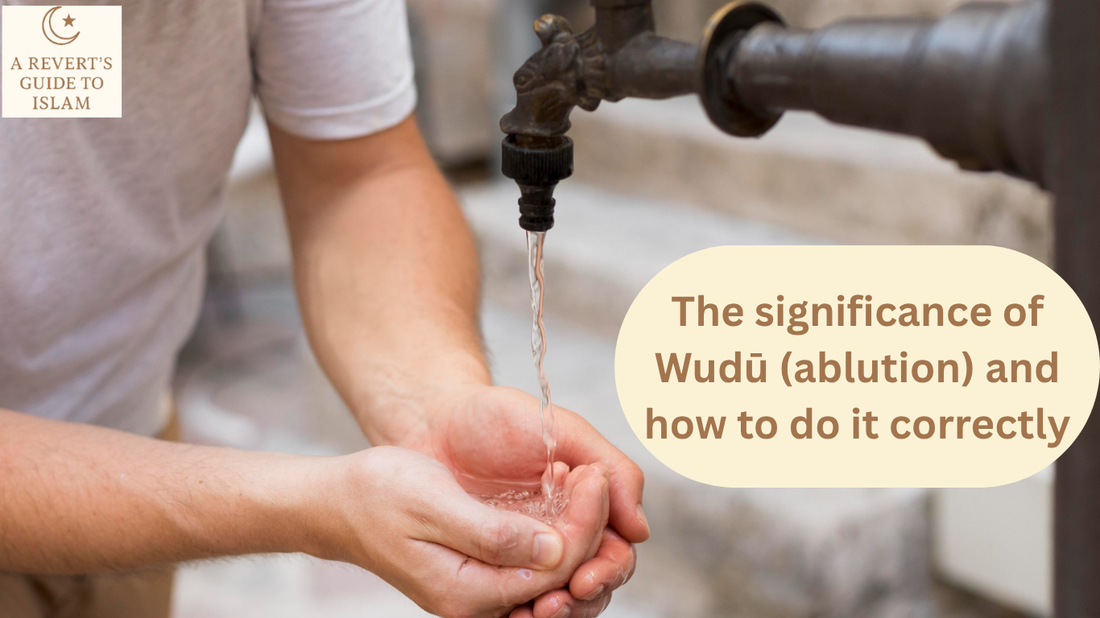
The Significance of Wudū (Ablution) and How to Do It Correctly
Share
1. Introduction – Understanding Wudū: The Gateway to Purity
Before standing in the presence of Allah, a believer prepares through purification a ritual known as Wudū. It is more than the mere act of washing; it is a renewal of both the body and the soul. At Reverts Guide to Islam, we help new Muslims understand that Wudū is not a burden of rules but a sacred opportunity to cleanse oneself internally and externally before meeting the Divine.
2. The Spiritual Importance of Wudū in Islam
Wudū purifies not only the physical self but also the heart. Each drop of water erases a layer of heedlessness and prepares the mind for awareness of Allah. It transforms the mundane act of washing into an intimate act of devotion and presence.
3. The Qur’anic Foundation of Ablution
Allah commands believers in the Qur’an:
“O you who believe! When you stand for prayer, wash your faces and your hands up to the elbows, and wipe your heads and wash your feet up to the ankles.”
(Surah al-Mā’idah 5:6)
This verse forms the foundation of the practice, outlining its obligatory steps and linking cleanliness directly to faith and obedience.
4. The Prophetic Tradition and Example
The Prophet Muhammad ﷺ performed Wudū with serenity and precision. His companions meticulously observed his method, ensuring that future generations would emulate it exactly. He taught that Wudū erases sins and elevates spiritual ranks, making it a means of purification beyond the surface.
5. The Inner Dimensions of Purification
While water cleanses the skin, intention purifies the soul. Each wash symbolizes the removal of sins the hands from wrongdoing, the tongue from falsehood, the feet from misguidance. True Wudū combines outward washing with inward sincerity.
6. When Wudū Is Required
Wudū is obligatory before performing the five daily prayers, handling the Qur’an, and circumambulating the Kaʿbah. It also renews spiritual readiness for remembrance (dhikr) and supplication (duʿāʾ).
7. When Wudū Becomes Invalid
Ablution breaks upon sleeping deeply, using the restroom, passing gas, or losing consciousness. Recognizing these nullifiers helps maintain purity and consistency in worship.
8. Preparing for Wudū: Environment and Intention
Before beginning, ensure a clean environment and focus your heart on the intention (niyyah) not uttered aloud but felt deeply: “I perform Wudū for the sake of Allah.” Purity begins with consciousness.
9. Step-by-Step Guide to Performing Wudū
9.1 The Intention (Niyyah)
Every act of worship starts with intention. Wudū is no different. Without it, even the cleanest washing is void of spiritual merit.
9.2 Washing the Hands
Wash both hands up to the wrists three times. Begin with the right. Ensure water reaches between the fingers.
9.3 Rinsing the Mouth and Nose
Take water into the mouth, swish, and expel it three times. Then inhale water gently into the nostrils and blow it out, removing impurities and refreshing the senses.
9.4 Washing the Face
Wash the face from the hairline to the chin and from ear to ear three times. Let the coolness of the water awaken gratitude and humility.
9.5 Washing the Arms
Wash the right arm up to the elbow, then the left, three times each. Water should flow evenly, symbolizing balance and fairness.
9.6 Wiping the Head
With damp hands, wipe over the head once. This simple act represents calm submission to divine authority.
9.7 Cleaning the Ears
Using the same moisture, wipe the inner and outer parts of the ears. Listening becomes purified, ready to receive truth.
9.8 Washing the Feet
Wash both feet up to the ankles, ensuring water passes between the toes. This final step completes the cycle of renewal and readiness for worship.
10. Common Mistakes to Avoid During Wudū
Rushing through steps, using excessive water, skipping limbs, or performing out of sequence are common errors. Mindfulness is essential; each motion deserves care and reflection.
11. The Etiquette of Performing Wudū
Begin with Bismillah (In the Name of Allah). Avoid conversation, waste, and distraction. Complete Wudū calmly and conclude with the supplication:
“Ashhadu an lā ilāha illallāh wa ashhadu anna Muḥammadan ʿabduhu wa rasūluh.”
This brings spiritual completion to the act.
12. The Rewards and Blessings of Maintaining Wudū
The Prophet ﷺ said that a believer who sleeps in a state of Wudū is accompanied by an angel who prays for forgiveness throughout the night. Maintaining Wudū regularly strengthens one’s connection to Allah and brings tranquility to the heart.
13. The Link Between Physical and Spiritual Cleansing
Wudū symbolizes the unity of the inner and outer worlds. Physical purity reflects spiritual intention. When performed with mindfulness, it bridges the visible and the unseen.
14. How Wudū Nurtures Mindfulness and Calm
The rhythmic motion of water, the deliberate sequence, and the silent remembrance of Allah calm the restless mind. Wudū teaches patience and focus virtues that extend beyond prayer into daily life.
15. Encouragement for New Muslims
Every believer begins with learning. Mistakes are natural, and sincerity is what counts most. With practice and guidance, Wudū becomes effortless and deeply fulfilling. Reverts Guide to Islam supports new Muslims through every step of their spiritual development, providing clear, compassionate guidance rooted in authentic sources.
